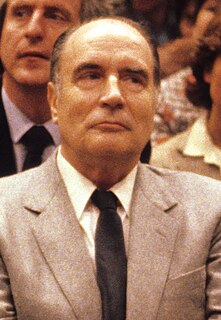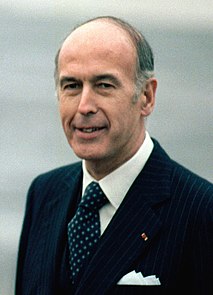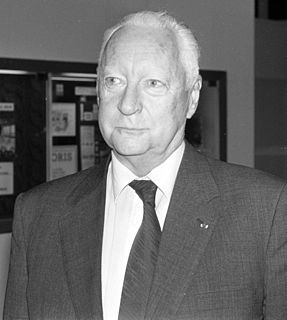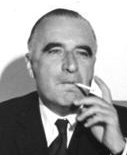This article needs additional citations for verification .(February 2008) (Learn how and when to remove this template message) |
| |||||||||||||||||||||||||||||||||||||||||||||||||||||||||||
All 491 seats to the French National Assembly 246 seats were needed for a majority | |||||||||||||||||||||||||||||||||||||||||||||||||||||||||||
|---|---|---|---|---|---|---|---|---|---|---|---|---|---|---|---|---|---|---|---|---|---|---|---|---|---|---|---|---|---|---|---|---|---|---|---|---|---|---|---|---|---|---|---|---|---|---|---|---|---|---|---|---|---|---|---|---|---|---|---|
| |||||||||||||||||||||||||||||||||||||||||||||||||||||||||||
| |||||||||||||||||||||||||||||||||||||||||||||||||||||||||||
| This article is part of a series on the |
| Politics of France |
|---|
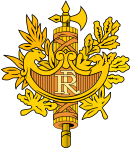 |
Related topics |
| France portal |
The French legislative elections took place on 12 March and 19 March 1978 to elect the sixth National Assembly of the Fifth Republic.

The Fifth Republic, France's current republican system of government, was established by Charles de Gaulle under the Constitution of the Fifth Republic on 4 October 1958. The Fifth Republic emerged from the collapse of the Fourth Republic, replacing the former parliamentary republic with a semi-presidential, or dual-executive, system that split powers between a Prime Minister as head of government and a President as head of state. De Gaulle, who was the first French President elected under the Fifth Republic in December 1958, believed in a strong head of state, which he described as embodying l'esprit de la nation.
On 2 April 1974, President Georges Pompidou died. The non-Gaullist center-right leader Valéry Giscard d'Estaing was elected to succeed him. Because the Gaullist UDR was the largest party in the pro-Giscard majority in the Assembly, Giscard chose Jacques Chirac to lead the cabinet. This period was one of renovation for Gaullism.
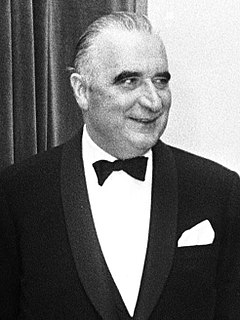
Georges Jean Raymond Pompidou was Prime Minister of France from 1962 to 1968—the longest tenure in the position's history—and later President of the French Republic from 1969 until his death in 1974. He had long been a top aide to president Charles de Gaulle. As president, he was a moderate conservative who repaired France's relationship with the United States and maintained positive relations with the newly independent former colonies in Africa.

Valéry Marie René Georges Giscard d'Estaing, also known as Giscard or VGE, is a French elder statesman who served as President of France from 1974 to 1981.
In France, the Gaullist Party is usually used to refer to the largest party professing to be Gaullist. Gaullism claim to transcend the left-right divide but in practice the current Gaullist party is the centre-right Republicans.
The presidential will to "govern towards the center" and to promote a "modern liberal society" disconcerted the Gaullist party. The Abortion Act and the reduction of the age of majority to 18 years worried a part of the conservative electorate. Furthermore, a personal conflict opposed the two heads of the executive. In August 1976, Chirac resigned because he considered that he "(had) not the means to carry on (his) function of Prime Minister".
Three months later, the UDR was replaced by the Rally for the Republic (Rassemblement pour la République or RPR). This, Chirac's electoral machine, was officially a member of the Presidential Majority, but frequently criticized the liberal and pro-European policy of President Giscard d'Estaing and his new Prime minister Raymond Barre. The executive duo reacted by federating the non-Gaullist center-right in the Union for French Democracy (Union pour la démocratie française or UDF).

The Rally for the Republic, was a Neo-Gaullist and conservative political party in France. Originating from the Union of Democrats for the Republic (UDR), it was founded by Jacques Chirac in 1976 and presented itself as the heir of Gaullist politics. On 21 September 2002, the RPR was merged into the Union for the Presidential Majority, later renamed the Union for a Popular Movement (UMP).

Raymond Octave Joseph Barre was a French centre-right politician and economist. He was a Vice President of the European Commission and Commissioner for Economic and Financial Affairs under three Presidents and later served as Prime Minister under Valéry Giscard d'Estaing from 1976 until 1981. As a candidate for the presidency in 1988, he came in third and was eliminated in the first round. He was born in Saint-Denis, in the French island of Réunion, then still a colony.

The Union for French Democracy was a centre-right political party in France. It was founded in 1978 as an electoral alliance to support President Valéry Giscard d'Estaing in order to counterbalance the Gaullist preponderance over the political right in France. This name was chosen due to the title of Giscard d'Estaing's 1976 book, Démocratie Française. The party brought together Christian democrats, liberals and radicals, and non-Gaullist conservatives, and described itself as centrist.
While the right-wing majority was divided, and the economic situation deteriorated, the "Union of Left" won the mid-term local elections. According to the polls, it was favourite to win the legislative election. In his Verdun-sur-le-Doubs speech, President Giscard d'Estaing warned the French voters that he could not prevent the enforcement of the left-wing Common programme if the "Union of Left" won. However, Socialists and Communists did not update their Common programme due to increasing tension between the two parties resulting from the PS gaining in electoral success at the PCF's expense.

Verdun-sur-le-Doubs is a commune in the Saône-et-Loire department in the region of Bourgogne in eastern France.

The Socialist Party is a social-democratic political party in France and was, for decades, the largest party of the French centre-left. The PS used to be one of the two major political parties in the French Fifth Republic, along with the Republicans. The Socialist Party replaced the earlier French Section of the Workers' International (SFIO) in 1969, and is currently led by First Secretary Olivier Faure. The PS is a member of the Party of European Socialists (PES), the Socialist International (SI) and the Progressive Alliance.
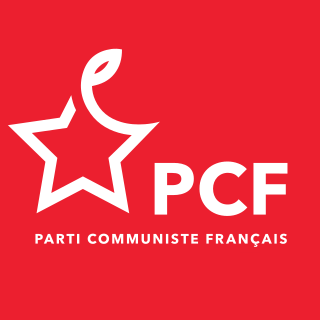
The French Communist Party is a communist party in France.
Contrary to what polls indicated, the Presidential Majority won but it obtained only 2,284 votes more than the "Union of Left". For the first time since 1936, the Socialists obtained more votes than the Communists. Furthermore, the French electorate appeared evenly shared between four equivalent political parties (RPR, UDF, PS, PCF). Raymond Barre was confirmed as Prime Minister. Until the French legislative election, 2007, it was the last time that either the right or the left had won back-to-back legislative elections.







